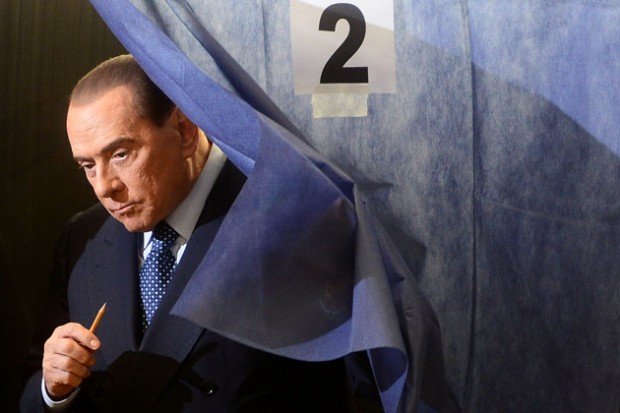
European markets and politicians have reacted anxiously after Italy’s general election produced a stalemate between centre-right and centre-left blocs.
France and Germany urged continued reform, while Spain described the result as a “jump to nowhere”.
Italian markets fell sharply while others in Europe and around the world opened down.
Centre-right leader Silvio Berlusconi said fresh elections should be avoided, and called for a period of reflection.
With all domestic votes counted, Pier Luigi Bersani’s centre-left bloc won the lower house vote but has failed to secure a majority in the Senate. Control of both houses is needed to govern.
A protest movement led by comedian Beppe Grillo won 25%, but the centrist bloc led by current PM Mario Monti came a poor fourth, with about 10%.
The outcome of the election, which comes amid a deep recession and tough austerity measures, was so close between the two main blocs that the margin of victory given in interior ministry figures was less than 1% in both houses of parliament.
The winning bloc automatically gets a majority in the lower house. But the same is not true in the Senate, where seat allocations are decided by region and can conflict with the national vote.
European politicians reacted with a mixture of calm and concern.
European Commission spokesman Olivier Bailly said the EU expected Italy to “honor its commitments” on debt and deficit reduction, and other structural reform.
“We clearly hear the message of concern expressed by Italian citizens,” he said at a news conference.
“The Commission has full confidence in Italian democracy and… will work closely with the future government towards the re-launch of growth and job creation in Italy.”
French Finance Minister Pierre Moscovici said the result “creates problems” but would not undermine the European single currency.
German Foreign Minister Guido Westerwelle, meanwhile, urged Italy to continue its reforms, and called for a government to be formed “as quickly as possible”.
But his Spanish counterpart there was “extreme concern” about the financial consequences.
“This is a jump to nowhere with positive consequences for nobody,” Jose Manuel Garcia-Margallo said, according to Associated Press news agency.

Shares and the euro fell as the outcome of the election became clear, amid concern that the reform agenda would be delayed.
Italy’s FTSE MIB index initially fell 4.7%, while London’s FTSE 100 shed 1.5% and share markets in Frankfurt and Paris also fell more than 2%.
In New York, the Dow Jones Industrial Average fell 1.55% and Asian markets lost between 0.7% and 2.2%.
The yield on Italian government bonds rose sharply, implying markets are more wary of lending to Italy.
As Silvio Berlusconi conceded to his opponents in the lower house, he said that everyone should now reflect on what to do next so that fresh elections could be avoided.
“Italy must be governed,” Silvio Berlusconi said.
“Everyone must be prepared to make sacrifices.”
He would not do a deal with Mario Monti’s centrist bloc, saying that the prime minister’s poor showing was down to popular discontent with his austerity measures.
Silvio Berlusconi, 76, left office in November 2011, facing claims of economic mismanagement as the eurozone struggled to contain Italy’s debt crisis.
Italians have had more than a year of technocratic government under Mario Monti. But his attempts to reduce spending caused widespread public resentment and his decision to head a centrist list in the parliamentary elections attracted little more than 10% of the vote.
In a surge in support, Beppe Grillo’s anti-austerity Five Star Movement attracted more than a quarter of the vote, making it the most popular single party in the lower chamber.
Correspondents say this was an extraordinary success for the Genoese comic, whose tours around the country throughout the election campaign – hurling insults against a discredited political class – resulted in his party performing well in both chambers.
[youtube I2XnJZNT_wE]
[youtube 7DLi5hKihEE]